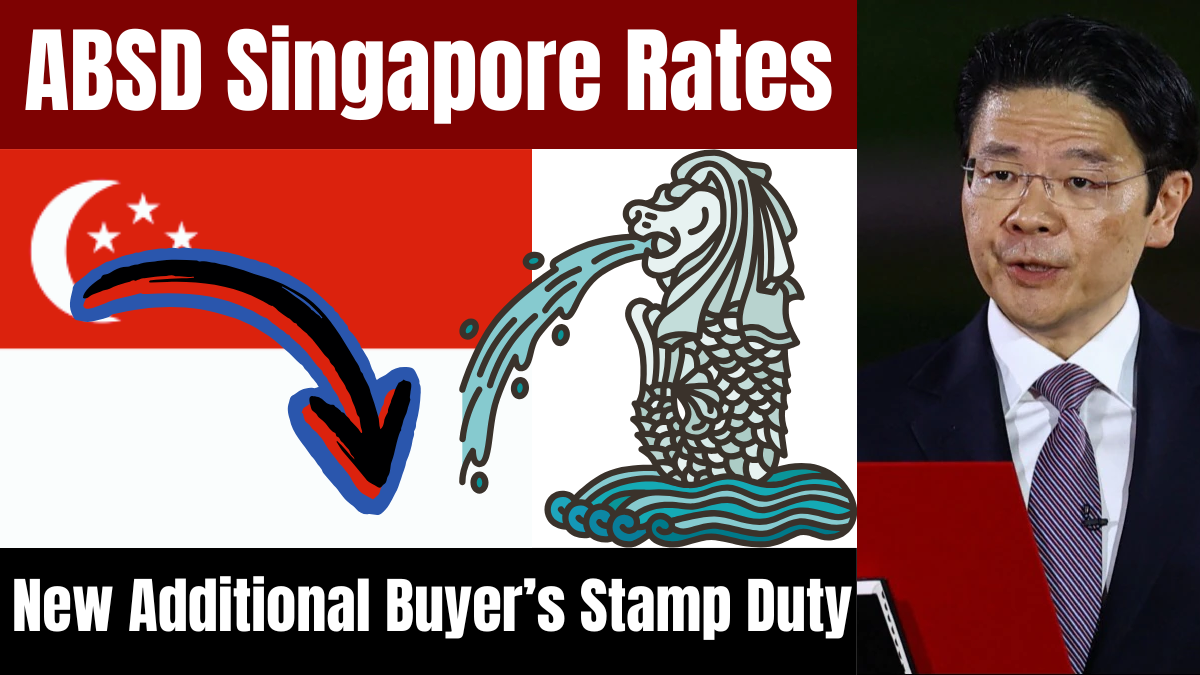Singapore’s real estate market is heavily regulated, and the Additional Buyer’s Stamp Duty (ABSD) is one of the key measures imposed to control property demand. Whether you’re a Singapore Citizen (SC), a Permanent Resident (PR), or a foreigner, knowing the current ABSD rates is crucial before investing in property.
In 2025, ABSD continues to be a significant factor in real estate purchases, particularly after the April 2023 property cooling measures. With foreigners now paying a massive 60% ABSD on any property purchase, buying property in Singapore has become more expensive than ever.

What Are the Latest ABSD Rates in Singapore for 2025?
The ABSD rates have been periodically revised, with the most recent hike occurring in April 2023. Below is an updated ABSD table for 2025:
| Buyer Category | ABSD Rate (2025) |
|---|---|
| SCs buying their first property | 0% |
| SCs buying their second property | 20% |
| SCs buying their third and subsequent properties | 30% |
| PRs buying their first property | 5% |
| PRs buying their second property | 30% |
| PRs buying their third and subsequent properties | 35% |
| Foreigners buying any property | 60% |
| Entities (companies or associations) buying any property | 65% |
| Trustees for any residential property | 65% |
| Housing developers for any residential property | 35% (Additional 5% non-remittable) |
These rates apply to either the purchase price or market value, whichever is higher.
How Is ABSD Calculated for Property Purchases in Singapore?
ABSD is calculated as a percentage of the property price. For example:
- If a Singapore Citizen buys a second property valued at $1.5 million, they will pay:
$1.5 million x 20% = $300,000 in ABSD. - If a foreigner buys any property worth $2 million, they will pay:
$2 million x 60% = $1.2 million in ABSD!
If multiple buyers with different profiles purchase a property together, the highest ABSD rate applies.
Why Was ABSD Introduced in Singapore?
ABSD was first introduced in December 2011 as part of Singapore’s property cooling measures. Its goal was to:
- Control rising property prices
- Reduce speculation in the housing market
- Prioritize housing for Singaporeans
- Discourage excessive property purchases by foreigners and entities
Over the years, the government has made several adjustments to ABSD rates, making it increasingly expensive for foreigners and investors to own multiple properties.
READ MORE: How US Fed Interest Rates Influence Singapore Mortgage Rates in 2025 – What Homeowners Must Know
What Is Considered a ‘Residential Property’ Under ABSD?
In Singapore, ABSD applies to all residential properties, including:
- HDB flats
- Private condominiums
- Landed properties (e.g., terrace houses, bungalows)
- Shophouses with residential spaces
However, commercial and industrial properties are not subjected to ABSD.
Can You Get an ABSD Remission or Exemption?
ABSD is generally not refundable, but there are some exceptions:
- Married couples (with at least one Singapore Citizen) can apply for an ABSD refund if they sell their existing property within six months of buying a new one.
- Divorced or separated individuals may get ABSD relief under certain conditions.
- Nationals from Iceland, Liechtenstein, Norway, Switzerland, and the USA are treated as Singapore Citizens under Free Trade Agreements, meaning they do not pay ABSD on their first property.
What Happens If You Don’t Pay ABSD on Time?
Failure to pay ABSD within 14 days of signing the Sales and Purchase Agreement results in penalties:
| Delay Period | Penalty |
|---|---|
| Up to 3 months | $10 or an amount equal to the unpaid ABSD (whichever is higher) |
| More than 3 months | $25 or an amount equal to 4 times the unpaid ABSD (whichever is higher) |
Late payments may also lead to legal action or the appointment of a lawyer to recover the outstanding amount.
Is There a Way to Avoid ABSD Legally?
While some property buyers try to reduce or avoid ABSD, not all methods are legal. Some common strategies include:
- Decoupling: One spouse transfers their share of a jointly-owned property to the other, making them a sole owner.
- Buying under a child’s name: Some parents register properties under their children’s names to avoid ABSD.
- Purchasing a commercial property: Since ABSD applies only to residential properties, some investors choose commercial real estate instead.
However, tax evasion is illegal in Singapore. The Inland Revenue Authority of Singapore (IRAS) conducts audits and rewards whistle-blowers up to $100,000 for reporting ABSD tax fraud.
FAQs
Who needs to pay ABSD in Singapore?
ABSD applies to Singapore Citizens buying a second or subsequent property, PRs buying any property, and foreigners buying any residential property in Singapore.
Do first-time homebuyers have to pay ABSD?
No. Singapore Citizens and eligible foreign nationals buying their first property do not have to pay ABSD.
How can married couples get an ABSD refund?
If at least one spouse is a Singapore Citizen, they can apply for an ABSD refund if they sell their first property within six months of buying a new one.
Can foreigners avoid paying ABSD?
Generally, no. However, foreigners from the USA, Iceland, Liechtenstein, Norway, and Switzerland are exempt from ABSD on their first property under Free Trade Agreements.
What happens if I pay ABSD late?
You will face penalties that can be up to four times the unpaid ABSD amount if you delay payment for more than three months.
Is decoupling a legal way to avoid ABSD?
Yes, decoupling is legal, but it must be done correctly under legal advice. Using decoupling for tax evasion is illegal and can lead to investigations.
Can I use CPF to pay ABSD?
Yes, you can pay ABSD using CPF funds, but you must first pay it in cash and then request a reimbursement from your CPF account.
Are commercial properties subject to ABSD?
No, ABSD only applies to residential properties. Commercial and industrial properties are not affected by ABSD.
Click here to know more.
A passionate content writer specializing in creating engaging, SEO-optimized content. With expertise in blogs, web copy, and storytelling, I craft words that connect with audiences and deliver results.
